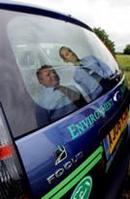Environment Agency signs up as bio-fuel Ford customer
 The Environment Agency has become the sixth organisation to include a Ford Focus Flexible Fuel Vehicle (FFV) on its fleet. The leading public body for improving the environment took delivery of the Ford bio-ethanol car at the agency's Bridgwater offices, Somerset.
The Environment Agency has become the sixth organisation to include a Ford Focus Flexible Fuel Vehicle (FFV) on its fleet. The leading public body for improving the environment took delivery of the Ford bio-ethanol car at the agency's Bridgwater offices, Somerset.Since launching the Ford Focus FFV in August 2005, over 100 have been sold – the majority in Somerset where Ford was the sole vehicle manufacturer backing the county's bio-fuel project.
Ford put its second bio-fuel model – Ford Focus C-MAX FFV – on sale at July's British International Motor Show, when supermarket and bio-ethanol retailer Morrisons became the fifth fleet customer to buy Ford FFVs.
The other four fleet purchasers of Ford FFV vehicles are Somerset bio-fuel project members Somerset County Council, Avon & Somerset Police, Wessex Water and Wessex Grain. The project secured vehicle and fuel supplies to encourage more widespread interest in FFV motoring.
Andy Taylor, Ford's European sustainability director, said: "Ford has supported Somerset bio-ethanol activities from the start and I'm delighted to welcome another organisation in the South West as a FFV customer."
Bio-ethanol is an alcohol/petrol mix bio-fuel commonly called E85 reflecting its 85 per cent bio-ethanol content. The 15 per cent of petrol is required for efficient and reliable ignition.
The renewable fuel can be produced in this country from home grown crops such as wheat or sugar beet. Carbon dioxide absorbed by crops used for bio-ethanol production means that CO2 emissions from a FFV are effectively reduced by up to 70 per cent.
Independent analysis of total CO2 released by a Ford Focus FFV by Imperial College, London, put the car's emissions at under 100 grammes per kilometer. While Ford's 1.8-litre FFV emits 169g CO2/km from its exhaust pipe, the Imperial College research says this drops to 99.6g when CO2 absorption by crops grown for bio-ethanol is factored in.
FFVs are capable of running on any mixture of E85 and petrol in the same fuel tank. The Environment Agency can refuel at five bio-ethanol pumps that have been installed in Somerset.
"The availability of bio-ethanol in our area makes this a real alternative to using vehicles which can operate only on conventional fossil fuels," said Mark Walmsley, Environment Agency fleet operations manager.
"We hope that people will begin to see the huge environmental and economic potential bio-fuels can offer. The team at Bridgwater is extremely enthusiastic about their new bio-ethanol car, which will be used for site visits and inspections."

